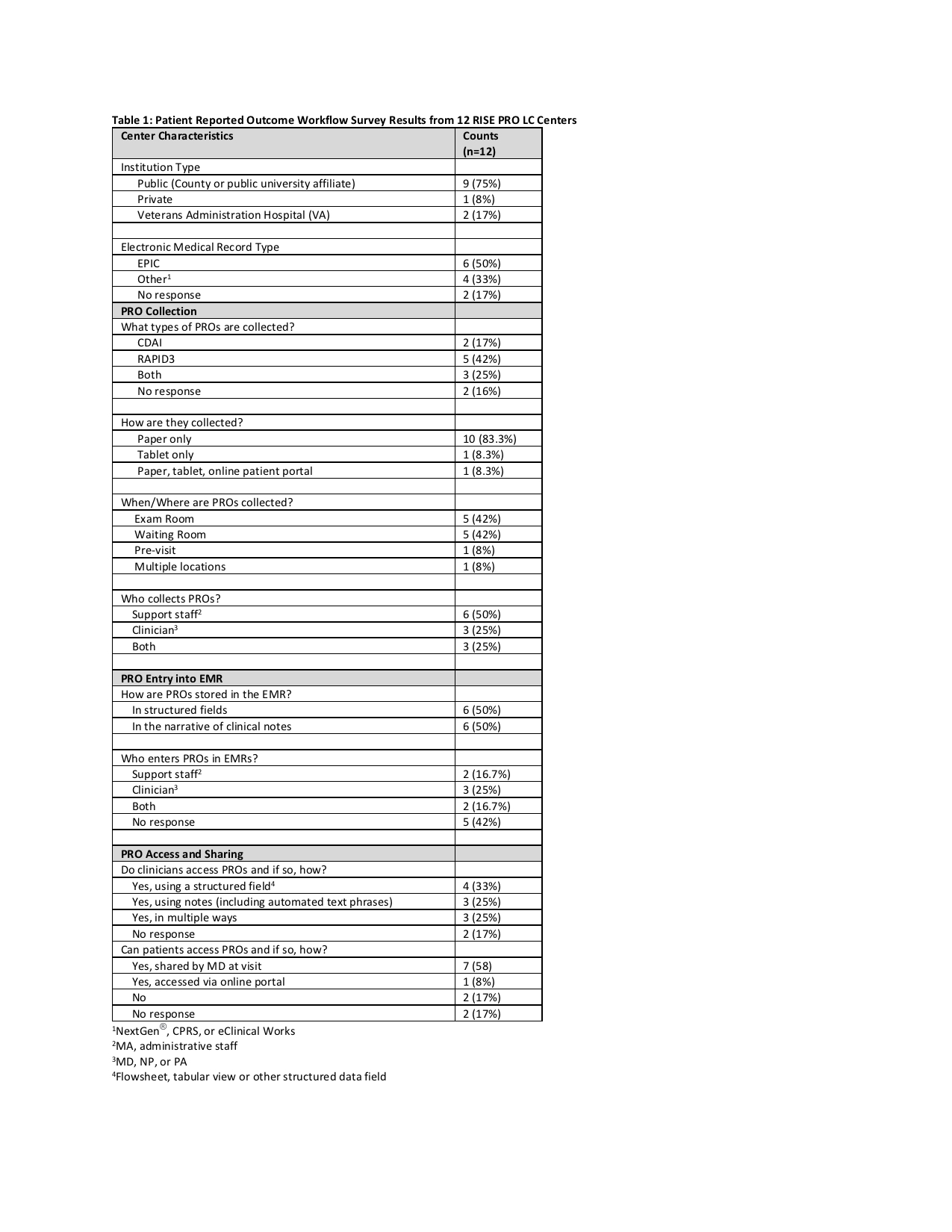Session Information
Session Type: Poster Session D
Session Time: 9:00AM-11:00AM
Background/Purpose: The use of patient reported outcomes (PROs) during rheumatology visits may facilitate shared decision making and encourage patients to share their health goals. However, few studies have analyzed how PROs are collected, stored, and discussed with patients in clinical practice. The Rheumatology Informatics System for Effectiveness Patient Reported Outcome Learning Collaborative (RISE PRO LC) launched in March 2019 as a national coalition of 15 medical centers from 10 states to exchange quality improvement ideas, such as how to leverage the electronic health record (EHR) to utilize PROs for patient care. We surveyed participating sites about PRO workflows and potential barriers to using PROs to engage patients in decisions about their RA treatment during office visits.
Methods: During the first quarter of 2020, 12 RISE PRO LC site physician champions completed a survey about PRO workflows. The survey collected information on the PROs used routinely in practice, the EHR systems employed, and also qualitative information about when and how PROs were collected, how the data were stored and retrieved, and how PROs were shared with patients. Descriptive statistics and thematic analysis using an inductive approach were used to analyze the survey data. Responses were coded, grouped into themes, and summarized.
Results: Of the 12 centers with responses, 2 were Veterans Affairs sites, and 10 were clinics associated with an academic medical center or county health system. EPIC systems was the most commonly reported EHR, followed by NextGen® and CPRS. For PRO collection, 10 of 12 sites used paper forms solely to collect PROs from patients in waiting rooms or exam rooms, while 1 used tablets alone. One site used paper forms, tablets, and an online patient portal for collection. Frequently cited challenges for PRO collection included inconsistent staffing, busy workflows for medical assistants, and language barriers. For PRO documentation in the EHR, 6 sites relied on structured data fields, while the remaining sites required providers to type PROs in the free-text of clinical notes. The sites that captured PROs in structured fields reported EHR capacity to review prior PRO scores longitudinally. Nine centers reported that clinicians regularly shared PROs with each patient during clinical visits. Only 1 site had capacity for patients to view PRO results between clinical encounters. Four of 6 sites that recorded PROs in structured EHR fields reported regularly sharing PROs with patients either during or after a clinical encounter (Table 1).
Conclusion: Although RA PROs were routinely collected in the participating rheumatology clinics surveyed, processes to gather, access and share PROs with patients highly varied. A vast majority of practices still employ paper surveys to collect PROs, and only half reported having structured data fields in their EHRs to store and longitudinally track PROs over time. PRO results were inconsistently shared with patients. These findings suggest significant opportunities to optimize workflows to collect, longitudinally store, and share PROs with patients to promote shared decision-making during rheumatology encounters.
 Table 1: Patient Reported Outcome Workflow Survey Results from 12 RISE PRO LC Centers
Table 1: Patient Reported Outcome Workflow Survey Results from 12 RISE PRO LC Centers
To cite this abstract in AMA style:
Subash M, DeQuattro K, Choden S, Liu L, Bajaj P, Bartels C, Barton J, Bermas B, Danila M, Desmarais J, Downey C, Ferguson S, Goglin S, Guthrie M, Jan I, Kumar N, Prakash S, Reiter K, Wahl E, Weinstein E, Zell J, Schmajuk G, Yazdany J. Workflows for Collecting and Using Patient-reported Outcomes Across Rheumatology Practices [abstract]. Arthritis Rheumatol. 2020; 72 (suppl 10). https://acrabstracts.org/abstract/workflows-for-collecting-and-using-patient-reported-outcomes-across-rheumatology-practices/. Accessed .« Back to ACR Convergence 2020
ACR Meeting Abstracts - https://acrabstracts.org/abstract/workflows-for-collecting-and-using-patient-reported-outcomes-across-rheumatology-practices/
